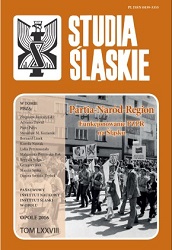Stosunek mniejszości na Górnym Śląsku do pamięci powstań śląskich (część 2)
The attitudes of minorities in Upper Silesia toward the memory of the Silesian uprisings (part 2)
Author(s): Bernard LinekSubject(s): Ethnohistory, Political history, Social history
Published by: Instytut Śląski
Keywords: historical politics;feasts and rituals;Silesian uprisings;national and ethnic minorities;
Summary/Abstract: The article analyzes the place, role and significance of the memory of the Silesian uprisings for two minority groups: Upper Silesian Germans and Upper Silesians in the period after 1989. The main source for its preparation is the press of both groups, however, it extends to the electronic media where the debate continues with much greater commitment. The Silesian uprisings became already in the interwar period the Polish basic founding myth, despite the violent conflicts in and around their remembrance between the camp of Wojciech Korfanty and Michał Grażyński. The latter imposed an image of the uprisings and described the period as one of the last victorious Polish national uprisings. For understandable reasons, Germans responded to that view negatively and presented their own narration of the victorious plebiscite of March 1921, annexed by the Genevan decisions in October of the same year. After the Second World War the sanative narration of the victorious military action was taken over with minor modifications by the People‘s Poland, emphasizing the peasant-worker composition of the insurgents. The German story of Upper Silesia was subordinated to the complex of expelled and the events of 1945 became the primary point of reference. The turn of 1989 and a new discussion on the Silesian identity, led to another conflict about the memory of the Silesian uprisings. The environments that were associated with the German minority preferred the image of those events as Polish-German civil war. The mental picture of Poland was undermined even more in certain Upper Silesian environments, which preferred an opinion of the foreign interference in the everyday life of the citizens, emphasizing the especially negative role of Poland. The Polish elites supported the old myths.
Journal: Studia Śląskie
- Issue Year: 2016
- Issue No: 78
- Page Range: 149-170
- Page Count: 22
- Language: Polish

